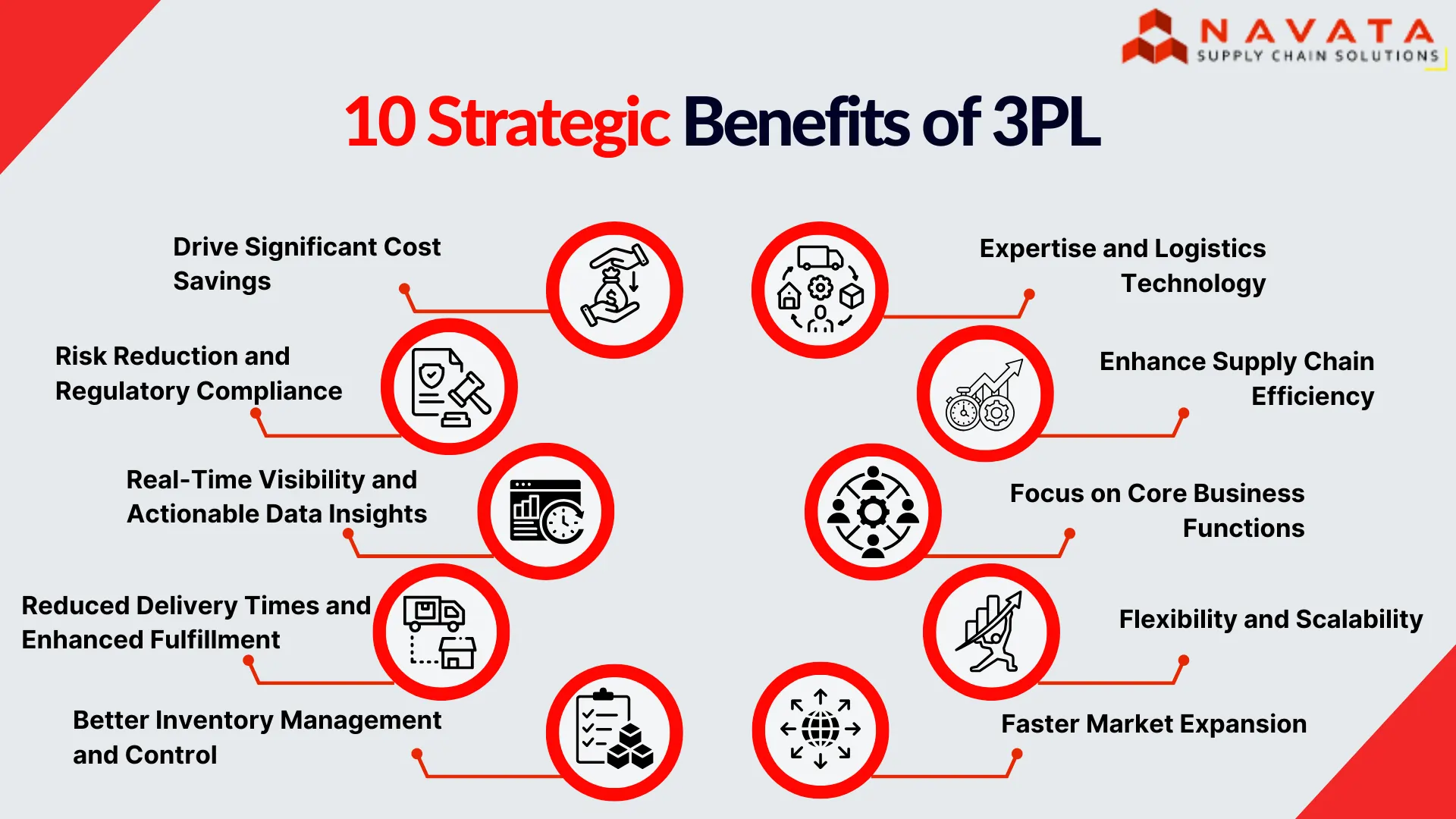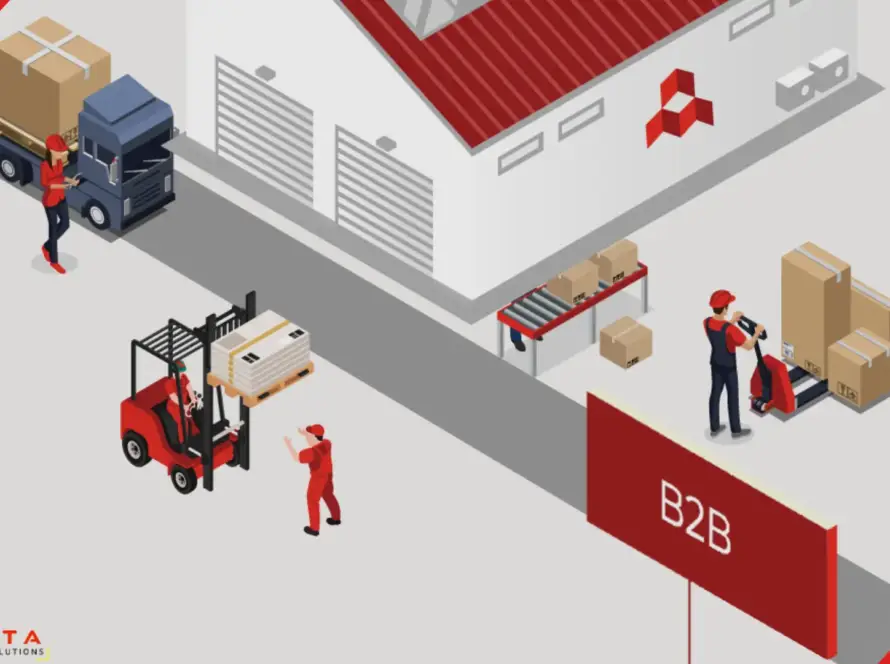10 Strategic Benefits of 3PL
Businesses are increasingly turning to Third-Party Logistics (3PL) providers to optimize their operations. From cost savings to scalability, 3PL services offer strategic advantages that help companies stay competitive, agile, and customer-centric.
Below, we break down the role & top benefits of partnering with a 3PL provider and how it transforms logistics performance.

1. Drive Significant Cost Savings
One of the primary reasons businesses adopt third-party logistics services is to minimize operational and transportation costs.
- 3PL companies benefit from bulk shipping rates, established carrier relationships, and optimized route planning.
- Businesses save on capital investment in warehousing, technology, and logistics infrastructure.
- Cut hidden costs related to freight delays, reverse logistics, and administrative overhead.
2. Access to Expertise and Logistics Technology
Navigating a global supply chain requires deep expertise and the right technology stack.
- 3PL providers bring years of domain knowledge in freight forwarding, customs, and transportation regulations.
- Tap into advanced logistics software, including transportation management systems (TMS), warehouse management systems (WMS), and inventory control solutions.
- Leverage automation tools for efficient order processing and real-time freight tracking.
3. Enhance Supply Chain Efficiency
Third-party logistics providers help businesses eliminate inefficiencies across the logistics cycle.
- Improve order accuracy, inventory turnover, and delivery times.
- Automate time-consuming tasks like inventory tracking, shipment coordination, and returns processing.
- Increase performance metrics like OTIF (on-time-in-full) and fulfillment rate.
4. Focus on Core Business Functions
By outsourcing logistics, companies can redirect focus to their strengths:
- Let 3PL partners handle warehousing, packaging, shipping, and last-mile delivery.
- Internal teams can focus on product development, branding, and sales growth.
- Simplify operations with end-to-end logistics support from your 3PL.
5. Flexibility and Scalability
3PL services are designed for agility, offering businesses the ability to scale operations up or down as needed.
- Manage seasonal peaks or sudden growth without capital investment.
- Use shared or on-demand warehousing to meet short-term storage needs.
- Support multi-channel fulfillment and omnichannel distribution strategies.
6. Faster Market Expansion
Expanding into new geographies becomes easier and faster with a 3PL partner.
- Gain access to regional fulfillment centers and distribution networks without upfront infrastructure costs.
- Navigate customs and local compliance requirements effortlessly.
- Reduce time-to-market and serve customers globally with cross-border logistics solutions.
7. Better Inventory Management and Control
Inventory issues lead to missed sales and high carrying costs—but not with the right 3PL.
- Leverage inventory management solutions that provide real-time tracking, smart forecasting, and auto-replenishment.
- Avoid stockouts, excess inventory, and long lead times.
- Use inventory optimization techniques to maintain healthy stock levels across multiple locations.
8. Reduced Delivery Times and Enhanced Fulfillment
3PL providers help shorten delivery windows and improve customer satisfaction.
- Utilize zone skipping, carrier aggregation, and route planning tools for quicker delivery.
- Enhance eCommerce fulfillment with faster picking, packing, and dispatching.
- Strengthen customer loyalty by delivering products faster and more reliably.
9. Real-Time Visibility and Actionable Data Insights
Visibility is crucial in today’s digital-first logistics world.
- Get access to real-time dashboards and data analytics for all logistics activities.
- Track shipments, monitor inventory levels, and respond to disruptions quickly.
- Improve demand planning and reduce inefficiencies using data-backed decisions.
10. Risk Reduction and Regulatory Compliance
3PLs minimize risk by handling the legal and operational complexities of logistics.
- Stay compliant with customs regulations, safety standards, and trade laws.
- Minimize the risk of fines, delays, and product damage during transit.
- Ensure your logistics operations are aligned with international and domestic compliance frameworks.
You Might Also Like To Read: 7 Steps to Choose the Best 3PL Provider for Your Business

Key Roles of 3PL Providers
1. Transportation Management
3PLs coordinate and manage the movement of goods from origin to destination.
- Negotiate with freight carriers for cost-effective shipping.
- Plan optimized delivery routes to reduce transit times and fuel costs.
- Provide real-time shipment tracking and ensure on-time delivery.
2. Warehousing & Distribution
They operate or manage strategically located warehouses to store goods closer to end customers.
- Offer multi-client warehousing and on-demand storage.
- Handle inbound and outbound logistics efficiently.
- Enable faster order fulfillment through distribution center networks.
3. Inventory Management & Order Fulfillment
3PL providers use advanced tools to optimize inventory flow and ensure customer orders are processed seamlessly.
- Monitor stock levels with inventory management software.
- Apply inventory management strategies to avoid stockouts and overstocking.
- Handle picking, packing, labeling, and shipping for eCommerce fulfillment.
4. Reverse Logistics & Returns Handling
They manage returns efficiently, helping businesses maintain customer satisfaction and recover value.
- Handle return shipping, inspection, restocking, or disposal.
- Provide visibility into return trends to improve product and service quality.
- Streamline the reverse logistics process to minimize losses.
5. Supply Chain Visibility & Reporting
Modern 3PLs offer real-time dashboards and reporting tools for better decision-making.
- Track shipments, monitor delivery status, and view inventory across all locations.
- Generate data-driven insights to improve performance and cut costs.
- Enhance supply chain transparency and forecasting accuracy.
6. Regulatory Compliance & Risk Management
3PLs help businesses navigate complex global trade regulations and mitigate logistics risks.
- Ensure compliance with customs, documentation, and tax regulations.
- Handle international shipping and cross-border logistics efficiently.
- Reduce penalties, delays, and damage risks with proactive logistics planning.
Make Supply Chain Your Competitive Advantage
Conclusion
Partnering with a Third-Party Logistics (3PL) provider empowers businesses to streamline operations, reduce costs, and scale efficiently. With expertise in warehousing, transportation, inventory management, and compliance, 3PLs act as strategic partners in optimizing logistics performance.
Whether it’s faster fulfillment, real-time visibility, or market expansion, the benefits of 3PL services are clear. By outsourcing logistics to trusted experts, companies can stay focused on growth while delivering superior customer experiences across every channel.
Thanks For Reading: What are the roles and benefits of 3PL?
Powered By 360Presence


2 Comments